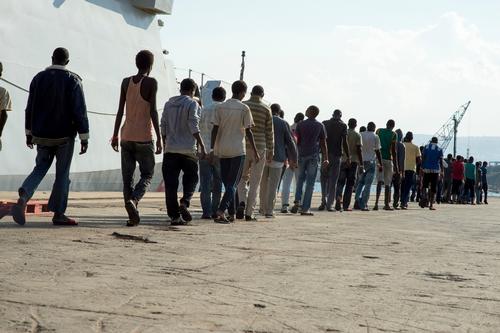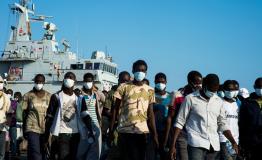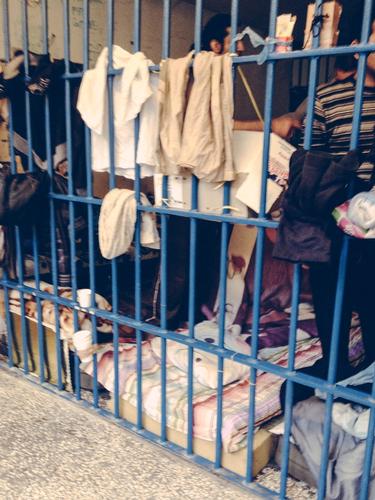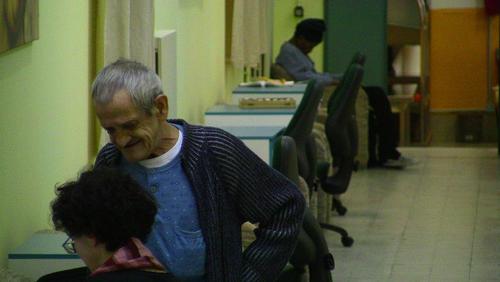Despite Italy’s Prime Minister’s Renzi declaration ten days ago to “continue the operation Mare Nostrum until the EU develops an action equivalent or superior to it”, the Italian Ministry of Interior announced officially that the specific search and rescue operation will cease to exist, effective beginning of November, as the EU FRONTEX operation Triton will be enforced. The Italian Prime Minister has said that Mare Nostrum was in response to grave human suffering and would have meant nothing if it was not continued, but this is exactly what seems to be happening, said Medecins Sans Frontieres (MSF) today.
As the main objective of the Triton operation is border control and not active rescue at sea, stopping Mare Nostrum will discontinue a much extended effort to save lives that was reaching the Libyan coasts where most boats depart.
“At a time where people are even more desperate to flee the wars in Libya, Syria or Iraq, we are shocked and disappointed to hear that Mare Nostrum will stop and that search and rescue in the Mediterranean sea will be now limited in scope. The announcement by the Minister of Interior Alfano is in direct contradiction with the commitment expressed by Italy’s President Renzi, only some weeks ago, to “continue the operation Mare Nostrum until the EU develops an action equivalent or superior to it” says Manu Moncada, Operations Corrdinator in Italy. “What we are seeing is an Italian government, bearing also the Presidency of the EU, taking back a political decision to save lives.”
The deadly shipwrecks over time, with more than 3,000 deaths so far, demonstrate the need for continuous search and rescue operations, while the chaos in Libya and the other crisis in the region exacerbate the need that these operations will be extended to the whole Mediterranean. As there are currently no safe alternatives to seek international protection in Europe, the sea route is the only option for thousands of victims of violence and torture, disabled people, pregnant women, and children. Search and rescue operations limited only to maritime areas closed to Italian waters leave an important gap, since 90% of migrants’ arrivals in Italy depart from the Libyan coast. This means that thousands of lives will be at stake should high seas fail to be actively patrolled.
“We are providing medical care to migrants and refugees in Italy for 12 years now and we have never seen so many women and children, most of them departing from Libya” says Stefano Di Carlo, MSF Head of Mission in Italy. “What will happen when Italy and the EU stop carrying out search and rescue operations close to Libyan coasts? How many “Lampedusa tragedies” can we tolerate? We ask President Renzi to confirm his commitment and the Italian parliament to stand up and respond to the humanitarian disaster at Italy’s maritime borders. At the same time, the EU’s response to the humanitarian tragedy of refugees and migrants dying at sea continues to be inadequate and disappointing.”
MSF is providing urgent medical care and mental health support at two of Sicily’s largest landing sites, Augusta and Pozzallo, to thousands fleeing the war in Syria, persecution in Eritrea and abject poverty in Sub-Saharan Africa. From January to September, MSF teams in Pozzallo conducted medical screening for nearly 19,000 people in 64 landings. The majority of people arrive in fairly good physical health conditions, as they are rescued early on by Mare Nostrum. Most of the medical problems treated are related to the journey before the sea, such as traumas, skin diseases from lack of hygiene in detention centres in Libya, and respiratory tract infections. In August, MSF set up a clinic at the port of Augusta with 582 outpatient consultations in the first month, of which 71 people reported to have been victims of violence.
MSF has been working in Italy with refugees and migrants since 2002, particularly on the island of Lampedusa from 2002 to 2013. Today MSF supports the Italian health authorities by providing medical care to refugees, migrants and asylum seekers in the provinces of Ragusa and Siracusa in Sicily.
In Greece, MSF was working in the north of the country, providing medical and psychological care to migrants, refugees and asylum seekers in border police stations and detention centres until April 2014. MSF currently maintains emergency preparedness capacity to intervene whenever necessary in the country. MSF will soon begin providing medical care for victims of violence in Athens in collaboration with two Greek organisations.






